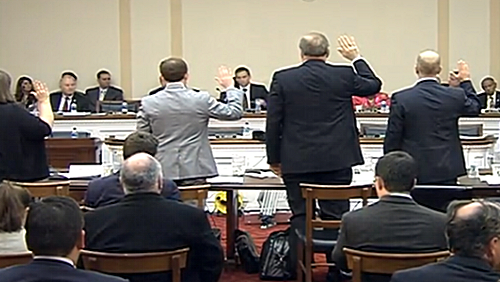The anti-online Restoration of America’s Wire Act had its hearing on Wednesday with the House Judiciary Subcommittee on Crime, Terrorism, Homeland Security, and Investigations.
The hearing began late and ended early as representatives had to press pause in order to return to the House floor for votes on other legislation.
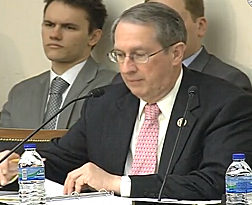 The event really got going after Rep. Bob Goodlatte (R-VI) – a chief architect of the 2006 Unlawful Internet Gambling Enforcement Act (UIGEA) – attempted some legislative jujitsu by declaring that RAWA wasn’t an unwarranted trampling of states’ rights but a pro-states rights bill.
The event really got going after Rep. Bob Goodlatte (R-VI) – a chief architect of the 2006 Unlawful Internet Gambling Enforcement Act (UIGEA) – attempted some legislative jujitsu by declaring that RAWA wasn’t an unwarranted trampling of states’ rights but a pro-states rights bill.
Goodlatte (pictured right) claimed RAWA supporters wanted to “protect the rights of states to prevent unwanted internet gambling from creeping across their borders and into their states.” This heretofore little discussed concept of online gambling ‘”bleeding over” state lines was to come up multiple times during Wednesday’s hearing.
Goodlatte did acknowledge “the other states’ rights dynamic,” i.e. how to handle states that have already enacted online gambling laws and any states that might want to do so in the future. Goodlatte fended off arguments that the federal government has no business telling states what types of gambling they can allow by saying that “wholly intrastate criminal conduct may nevertheless have an interstate nexus … Therefore it is within Congress’ purview to legislate this conduct.”
 Rep. John Conyers (D-MI) spoke briefly, saying he opposes RAWA and agrees with the Department of Justice’s 2011 opinion that the 1961 Wire Act applied only to sports betting. Conyers (pictured left) submitted a letter from the Fraternal Order of Police saying an online gambling ban wasn’t the answer.
Rep. John Conyers (D-MI) spoke briefly, saying he opposes RAWA and agrees with the Department of Justice’s 2011 opinion that the 1961 Wire Act applied only to sports betting. Conyers (pictured left) submitted a letter from the Fraternal Order of Police saying an online gambling ban wasn’t the answer.
RAWA sponsor Rep. Jason Chaffetz (R-UT) spoke next, saying that any Wire Act fix should be done through Congress, not from the “bowels” of the DOJ. Chaffetz saw Conyers’ letter and raised 42 documents from RAWA supporters, who’d collectively concluded the issue was “fraught with problems and challenges.”
JOHN KINDT
When it got time to the witnesses, first up was John Kindt (pictured below), the originator of the “online gambling = crack cocaine” meme. Kindt lived up to his batshit reputation, calling online gambling “an issue of strategic financial stability and Wall Street regulation.” Kindt recycled his previous claim that legal online gambling would recreate the 2008 global economic crisis, via “the creation of vacuous gambling stocks.”
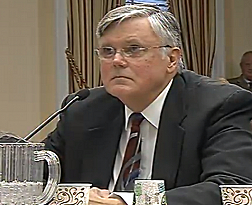 Kindt’s written testimony claimed online gambling was the real ‘killer app’ in that it killed “personal, business and institutional finances.” Online gambling would also leave America’s military incapable of repelling threats (presumably by sapping and impurifying our precious bodily fluids).
Kindt’s written testimony claimed online gambling was the real ‘killer app’ in that it killed “personal, business and institutional finances.” Online gambling would also leave America’s military incapable of repelling threats (presumably by sapping and impurifying our precious bodily fluids).
Kindt cited a 1999 study which concluded that the internet was impossible to regulate, much like another 1999 theory about the Y2K bug blowing up the world that New Year’s Eve. Kindt did attempt to throw modernity a bone by updating the ‘click your mouse, lose your house’ meme to “click your phone, lose your home.”
Tellingly, the overwhelming number of studies Kindt cited in his written testimony were those he’d written himself. Seriously, America… If you want to stop having your political establishment recognized as the world’s top clown college, you’ve got to stop giving Bozos like Kindt a seat at the table.
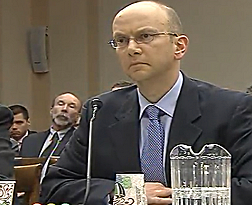 LES BERNAL
LES BERNAL
Up next was Stop Predatory Gambling director Les Bernal (pictured left), who is against all forms of state-sponsored gambling, which he believes “contribute to the inequality of American society.”
Bernal said state governments were “blatantly – blatantly – cheating and exploiting their own citizens [via] extreme forms of gambling they sponsor and market.” Bernal insisted that citizens have the right to “engage in a financially damaging activity” like gambling, but that government has no business encouraging people to do so.
Bernal claimed online gambling games were “literally designed so citizens can’t stop using them.” Bernal warned legislators that “no one’s pounding the table for [online gambling] in your district” and asked who among them would protect citizens from “active predatory” states.
Bernal said state-sponsored gambling operations “add to rather than ease long-term budget problems for states.” As such, the two-thirds of citizens who don’t gamble “pay higher taxes for less services.” Bernal suggested modifying the principle of ‘no taxation without representation’ to include “no taxation by exploitation.”
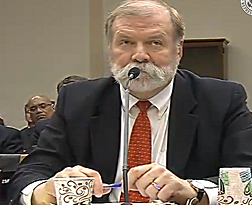 MICHAEL FAGAN
MICHAEL FAGAN
Up next was Michael Fagan (pictured right), Stop Predatory Gambling board member and teacher of a course on money laundering and terrorism at Washington University School of Law in St. Louis. In his former role as Assistant US Attorney for the Eastern District of Missouri, Fagan also played a key role in the prosecution of BetonSports CEO David Carruthers.
Fagan originally couldn’t figure out how to turn his microphone on, so we’re incorporating much of his written testimony.
Fagan said his experience had taught him that “there is no way that the federal government, or any individual or combination of state governments, can expand to the degree necessary to effectively police and regulate the likely scale of legalized internet casino, poker and/or sportsbook gambling.” (Hear that, England? Time to dismantle your decade-old regulated online gambling industry.)
Fagan said the 2011 DOJ opinion “seemingly is the product of someone trying to find a reason to allow online gambling’s expansion rather than to discern and implement Congress’ sensible and comprehensive scheme from 1961 to preclude organized crime from all types of illegal gambling-generated funds.” Fagan offered his own Wire Act rewrite, which would add the phrase “any sporting or non-sporting event or contest” to the list of prohibited wagering activities.
Fagan warned against allowing an online poker carveout from RAWA, saying it was a plot to “build the framework for casino interests to bring in online slots.” This was the gaming industry’s “historically proven device for undermining informed majority rule.”
Fagan cited the “purposely vague” description of gambling in the 1988 Indian Gaming Regulatory Act as a Trojan Horse that ultimately led to “the massive and unrelenting wave of casino gambling that has spread across most states.”
Fagan trotted out the ‘online poker as terrorist piggy bank’ meme, claiming “multiple investigations in many parts of the world continue, often in a classified setting, to find further evidence of terrorist financiers’ reliance on online gambling.” (This misguided reliance must explain why there’s been no further attacks on US shores, given that studies have shown online poker to be a truly inefficient method of laundering money.)
Fagan said “nothing suggests that internet gambling operators would ‘do compliance’ better and, indeed, recent history suggests they would do worse.”
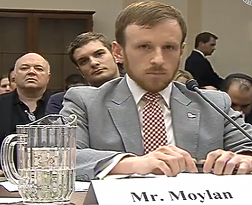 ANDREW MOYLAN
ANDREW MOYLAN
Up next was Andrew Moylan (pictured right), senior fellow at R Street, a conservative think-tank with a states’ rights hard-on. Moylan said his conservative and libertarian brethren hold a wide variety of views on gambling but were united in their view that the federal government was “too large and too powerful” after decades of congressional overreach, and that was what prompted his appearance at the hearing.
Moylan said RAWA is at odds with the basic principles of federalism and the more narrowly targeted language of the original Wire Act and UIGEA. Those latter two laws were “carefully circumscribed to cover only international or interstate activity.” By expanding this to include purely intrastate conduct, RAWA “may well empower the federal government in a way we think is unwise.”
RAWA “potentially establishes a dangerous precedent in suggesting that mere use of a communication platform like the internet subjects all users and all activity to the reach of the federal government, no matter its location or its nature.” Moylan said it was “incumbent upon Congress to exercise restraint” in its application of the Constitution’s Commerce Clause.
Moylan suggested a simple fix would be to modify RAWA to allow “intrastate payments and those between states with legal gambling.” Otherwise, Moylan said RAWA represented a “problematic use of Commerce Clause power.”
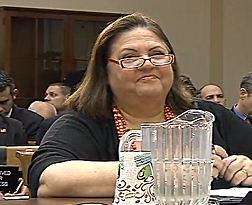 PARRY AFTAB
PARRY AFTAB
Next came Parry Aftab (pictured left), WiredSafety.org executive director and former board member of FairPlayUSA. Aftab said she had no stake in gambling; her stake was in protecting people online.
Aftab addressed the ‘think of the children’ arguments straight off, saying only three kids had managed to access Nevada online poker sites – two of which occurred during the sites’ test phase – using their parents or older brother’s accounts. Aftab also addressed the terrorist angle, citing the regulated states’ identity controls and the unwillingness of most jihadis to deal with the Internal Revenue Service.
Aftab pointed out that the three regulated states didn’t permit players to access their sites using the remote access software they use to access their home computers. The technological safeguards in place “will block anything that’s a little off.”
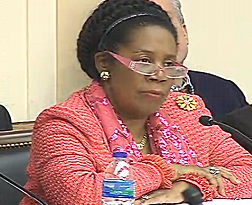 QUESTIONS, ANSWERS
QUESTIONS, ANSWERS
When it came time for questions, Goodlatte asked if there was any role for the federal government to play here. Moylan said the feds should restrict themselves to interstate issues, Aftab believes the feds should enact geolocation standards and Bernal suggested the feds should crush the states with an iron fist.
Goodlatte then queried the panel on whether online poker was different from online lotteries, then answered his own question by saying “there really isn’t that big a distinction” between various forms of online gambling.
Rep. Sheila Jackson Lee (D-TX) (pictured right) raised the issues of minors gaining access to online gambling sites, to which Aftab explained that you “can’t recognize a kid online, but you can recognize adults” via bank accounts, public records, etc. All these databases have to agree, otherwise access is denied.
 When the pols returned post-vote, Chaffetz (pictured left) returned to the ‘bleed over’ concept, saying it was “naïve at best to think you can suddenly just create these fictitious borders because of technology and prohibit [online gambling] coming into the state of Utah …You give me a good 16-year-old and about five minutes he can figure out how to spoof this or put some virtual private network out there … It is fiction for anyone to believe they can just virtually create these borders.”
When the pols returned post-vote, Chaffetz (pictured left) returned to the ‘bleed over’ concept, saying it was “naïve at best to think you can suddenly just create these fictitious borders because of technology and prohibit [online gambling] coming into the state of Utah …You give me a good 16-year-old and about five minutes he can figure out how to spoof this or put some virtual private network out there … It is fiction for anyone to believe they can just virtually create these borders.”
Aftab challenged Chaffetz by saying the three regulated market states already prohibit VPN use, which led Chaffetz to snort: “Who’s the VPN police?” Aftab admitted that there “always an exception to things” but said technology would prevent 16-year-olds from ‘spoofing’.
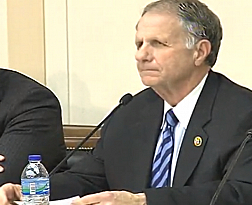 Rep. Ted Poe (R-TX) emerged as a RAWA skeptic, introducing an anti-RAWA letter by the Competitive Enterprise Institute’s Michelle Minton. Poe (pictured right) asked Moylan whether the feds had the right to regulate the internet, to which Moylan said he found it very problematic that all internet activity would automatically require federal intervention.
Rep. Ted Poe (R-TX) emerged as a RAWA skeptic, introducing an anti-RAWA letter by the Competitive Enterprise Institute’s Michelle Minton. Poe (pictured right) asked Moylan whether the feds had the right to regulate the internet, to which Moylan said he found it very problematic that all internet activity would automatically require federal intervention.
Moylan said that to believe otherwise “eviscerates” any real limitation on the Commerce Clause. Moylan was particularly concerned by RAWA’s expansion of the Wire Act’s text to apply to internet transmission “incidentally or otherwise.”
Moylan also added that RAWA’s exemptions for horseracing and fantasy sports “puts the lie to the fact that all gambling is in and of itself pernicious.”
Poe rejected Bernal’s argument that states have no business regulating gambling because “all gambling is bad,” citing the effect of the 1920’s prohibition of alcohol, i.e. creating more crime than it prevented.
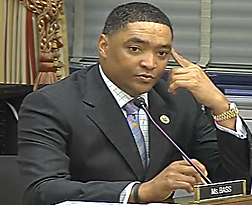 Rep. Cedric Richmond (D-LA) asked panelists a point-blank question: How does this affect the Louisiana Lottery? Aftab was blunt: “As written, your lottery goes offline.” Richmond (pictured left) asked the other panelists if anyone disagreed with that view, and no one put up their hand.
Rep. Cedric Richmond (D-LA) asked panelists a point-blank question: How does this affect the Louisiana Lottery? Aftab was blunt: “As written, your lottery goes offline.” Richmond (pictured left) asked the other panelists if anyone disagreed with that view, and no one put up their hand.
Rep. Poe finished up the proceedings by asking whether RAWA would encourage, discourage or have no effect on crime. Aftab again put it plainly: outlaw the legal avenues and you willingly surrender any ability to monitor for online shenanigans.
PRE-GAME WARMUPS
Hours before the hearing got underway, a series of demonstrations on the capabilities of online gambling technology was put on in Washington by the Poker Players Alliance, Caesars interactive Entertainment and geolocation specialists GeoComply. The idea was to provide lawmakers and the media with evidence to refute many of the Chicken Little claims of the pro-RAWA crowd.
The day also saw the rollout of a new campaign by the Sheldon Adelson-funded Coalition to Stop Internet Gambling (CSIG). The reliably hyperbolic spot (viewable below) claims there is no technology that can “fully protect” children from brain-dead parents leaving their tablets around without logging off their online gambling site.



